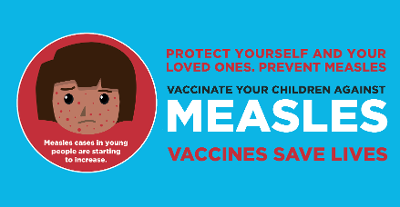Measles vaccinations up among residents but more needed as national cases persist
There has been an encouraging uptake of the measles vaccine in St Helens Borough in recent months, but with cases remaining in most regions of England, and some children having been hospitalised by the illness, the Public Health recommendation to vaccinate remains.

Article date: 15 May 2024
Local uptake of the MMR (measles, mumps and rubella) vaccine is now among the best in the Cheshire and Merseyside region and better than England and the North West, at 95.3% for one dose and 88.9% for the recommended two doses in childhood - according to UK Health Security Agency data from Q3 2023/24.
In the UK, parents and guardians are offered two doses of the MMR vaccine for their children by the time they start school (or by 3 years and 4 months of age).
Having both doses of the MMR vaccine provides up to 99% effective life-long protection against measles.
If you are not sure if you or your child is up to date with the MMR vaccination, check their health record or contact your GP practice. You're also encouraged to check your vaccination status if you're a frontline health or social care worker, as you are more likely to come into contact with people who are vulnerable to serious illness.
Councillor Sue Murphy MBE, St Helens Borough Council's Cabinet Member for Public Health, said:
"The increased vaccination uptake among local families is really encouraging, but there are still some children outstanding and some adults who may not have received two doses in childhood.
"The MMR vaccine is one of the safest and most successful vaccinations used in the world today, estimated by the World Health Organisation to have saved 17.1 million lives worldwide since 2000. It is the best possible defence for you and your family from a common childhood illness that can lead to some very serious and life-threatening health issues."
The first symptoms of measles include:
- High fever
- Sore, red watery eyes
- Cough
- Aches and generally feeling unwell
After a few days symptoms include:
- Small white spots may appear inside the cheeks or on the back of the lips
- A blotchy red-brown rash which starts on the face and behind the ears before spreading to the rest of the body. The rash may be harder to spot on darker skin tones.
Confirmed and likely cases of measles should self-isolate for the duration of the infectious period (from 4 days before rash onset and a further 4 days afterwards).
If you think you may have measles, telephone your doctor/general practitioner (GP) surgery or ring NHS 111 (or online at https://111.nhs.uk). As measles can spread to others easily, call your GP surgery before you attend if you do need to be seen.
More information about the symptoms of measles and what to do about them can be found on the NHS website at www.nhs.uk/conditions/measles.




